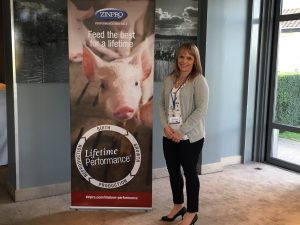Jenny Patterson, a Gentec research associate, has built an enviable portfolio of industry support with pig companies in Alberta, Ontario and the US. As with all worthwhile things, this level of success didn’t come fast.
Jenny completed her MSc in Animal Science at UAlberta in 2001, specializing in Gilt Management and Reproduction. She then spent a couple of years at the Prairie Swine Centre in Saskatoon as a research assistant, where she was involved in running her first commercial trial in gilt management. She returned to the UAlberta as a research coordinator at the Swine Research and Technology Centre, for the Swine Reproduction and Development Program led by Drs George Foxcroft and Michael Dyck, where she became increasingly involved in large commercial research trials. Their research work focused on implementing management practices to better capture the true genetic potential of contemporary dam and sire lines by improving gilt management to maximize sow lifetime productivity, improving the impact of AI boars in the production system and improving efficiencies at the production level.
Her most recent work was as part of a coordinated National Pork Board research strategy at Holden Farms in 2014 to understand how birth-weight phenotype is a key factor in limiting sow lifetime productivity—and therefore important in the overall efficiency of replacement gilt management.
“As the project winds down, I was able to take some of the lessons learned and apply them to the industry,” she says. “Now, I’m partially supported by Sunterra Farms and Sunhaven Farms in Alberta, Hanor Company and PIC in the USA. Each group has slightly different goals: from gilt management to data collection and analysis to find areas for improvement.”
“I play a key leadership role in Gentec’s pork production efficiency initiative,” says Jenny. “The genetics are really good but translating them into industry is a challenge. We can do that by improving gilt management strategies—and resolving or reducing the gap between genetic potential and actual productivity.”
Among other tools, she uses data visualization to help make sense of the piles of data stored in production databases. What Jenny sends back to the industry client is a set of reports and recommendations to implement, and then manage and track the improvements.
“I enjoy the opportunity to use large production databases and going through that data to identify areas for improvement,” she says. “I firmly believe in making data-driven decisions.”
The industry partners provide excellent opportunities to foster important collaborative relationships—some of which started 15-20 years ago. Their international reach has seen projects land in Jenny’s lap from all over the Americas, and cover a wide range of farm types. Indeed, the next round of projects will see many of the same partners collaborating again.
It was as part of a National Pork Board study that Jenny got to know Gentec. Once the key birth weight phenotypes were determined, the team at Gentec completed association analyses between SNPs and the component phenotypic traits that determine litter size and litter quality (ovulation rate, early embryonic survival, placental development and uterine capacity) to identify genomic regions/genes and their potential biological functions and genetic improvement.
Jenny emphasizes that she is not a geneticist. Yet Gentec has opened plenty of doors to industry and academia.
“It was an honour to join the Gentec team in 2018,” she says. “As well as technology transfer directly to producers, another important part of my work is delivering research results at professional conferences, invited industry and technical meetings locally and internationally. Gentec has sown opportunities for me to help develop new projects; and I’m very excited to learn new skills and to use my expertise in new ways.”

